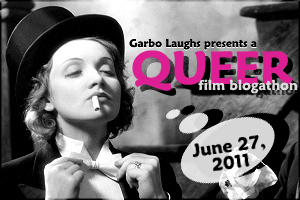Dream Home (2010, directed by Ho-Cheung Pang) is an artifact of the zeitgeist. The global housing bubble hit Hong Kong, too, and, as it did everywhere else, it popped in 2008. But in the run-up, people did a lot of foolish things. At the beginning of Dream Home, there's an onscreen credit that claims that it's based on a true story, though I haven't verified that. If it is, well, real life is more like a horror movie than we normally think. A pretty outrageous horror movie, at that.
The story here follows Cheng Lai-Sheung (Josie Ho), a telemarketer for a bank who dreams of owning her own flat. The one she's got in mind has a view of the harbor, but such properties are expensive and she has plenty of competition. When the deal she has lined up falls through, she takes drastic action to change the rules of the game to her advantage. This involves brutally murdering eleven people. Real estate can be pretty cutthroat. Literally, in this case.
At its most basic level, Dream Home is a slasher movie. The slasher movie is like a musical. The story is there solely for the set pieces. In the slasher film, the set pieces are bits of ultraviolence rather than song and dance numbers, but the idea is the same. If we're grading this on the quality of its violence, then, man, Dream Home is a corker. It perpetrates ever more ghastly mayhem as the movie progresses. You can't help but laugh at the filmmakers' moxie (if you can tolerate these scenes, that is). They have a kind of gruesome slapstick quality. The victims are generally slasher movie-type victims, too, particularly a group of teenagers who are getting high and having sex. This section of the film is so over the top that you know that the filmmakers are having fun at the slasher movie's expense. It's fun to watch. At least one of the murder scenes in this film is NOT fun to watch. It involves a pregnant woman, a couple of cable ties, a plastic bag, and a vacuum. This is fairly early in the film and it's there to weed out the women from the girls, because it's friggin' brutal. In comparison, the scene where a kid who has been disemboweled takes a last hit off his joint is positively antic.

As you might guess from my description, the mood of Dream Home is wildly variable. When it's busy letting blood, it's singleminded and outrageous. When it's not, when it's providing the backstory for our erstwhile murderer, it becomes kind of sentimental, which makes the movie's middle act sag under its own weight. The scenes of our heroine's life at present are a bit different, including as they do quickie encounters with a married man who doesn't respect her and a dull, mind-numbing job. The institutional sexism on display in the film is appalling, but I don't know that the film's solution to Cheng Lai-Sheung's lot in life is all that workable for most women. It's only after her murder rampage that she finds the self-esteem to blow off her asshole boyfriend. Self-realization through mass murder is pretty funny, though.
All of this is filmed with the same high gloss you see in most Hong Kong films these days. There's an emphasis on architecture here that's unsurprising given the movie's subject matter, and there's that feeling of Hong Kong Noir. The frequent shots of the city as a whole are deeply alienating, while the interiors are all hard surfaces and post-modern design. Only the architecture in the flashback scenes seems like it's inhabitable, but the film takes pains to note that that Hong Kong, like many other places, has been swept aside by predatory real estate developers. Real estate developers are conspicuous by their absence among the film's victims, it should be noted. I don't know if that's intentional, but if it is, it's telling.
And then there's the socio-economic reality. The movie suggests that our heroine is buying at the wrong time, that she's foolish to get into the housing market when the bubble is expanding. She drives the price down with her rampage, sure, but at the end of the film, her investment seems like no sure thing in the wake of the 2008 sub-prime crash. The movie is meticulous, too, in its depiction of process. There are a lot of scenes here involving mortgage brokers and real estate agents, and they should be familiar to anyone who has ever bought a house. There's a kernel of a fine dramatic film in these scenes, but I don't know that they sit well with the deranged horror movie to which they are appended. But then, none of that really matters, because it's not what follows you away from the movie. By the time it resolves all of this, the audience has been too brutalized to notice these kinds of cinematic niceties.
Current tally: 10 films
First time viewings: 10

Around the web:
The Vicar of VHS is on track with viewings of Ginger Snaps Back and Unholy.
Eric at Expelled Grey Matter takes on Frankensteing 1970, Sisters of Death, Ghost Story, and The Zombies of Mora Tau.
Andreas over at Pussy Goes Grrr takes a look at some of his favorite horror characters.
Justin over at The Bloody Pit of Horror continues to crank out reviews for all kinds of horror movies from around the world, including Gakidama, Deadline, Mr. Vampire III, and Bloodlust. He also takes time out to pay tribute to the late David Hess, who passed away this weekend.
















No comments:
Post a Comment